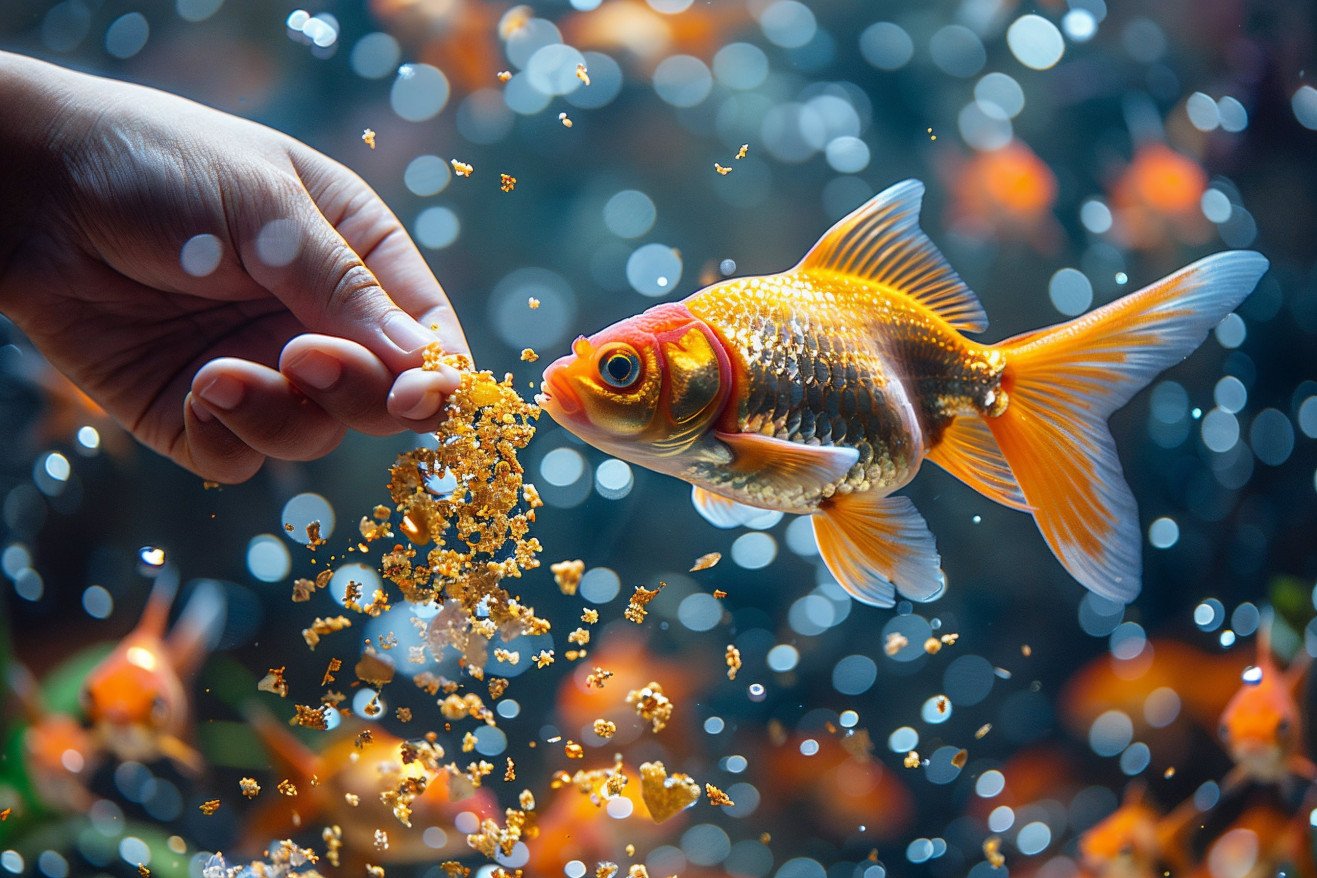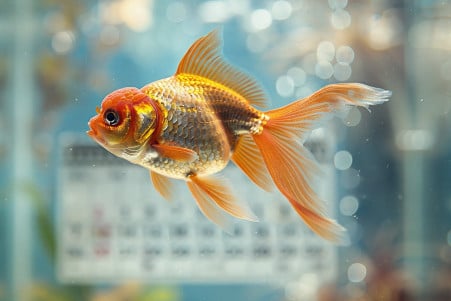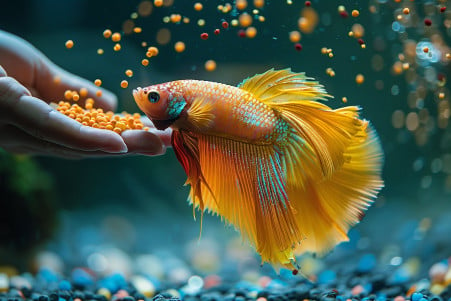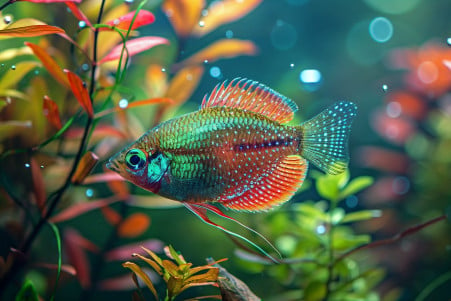How Often Should You Feed Goldfish? Ideal Feeding Schedule
23 May 2024 • Updated 22 May 2024

If you've ever had goldfish, you've probably wondered how often you should feed them. Goldfish should be fed 1-3 small portions per day, with portions no bigger than the goldfish's eye. Make sure to only feed them what they can eat in 2-3 minutes to prevent overfeeding and dirty water.
Goldfish are known for being pretty tough fish, but how often you feed them and the amount you feed them are important for their overall health and well-being. We'll go over information from veterinarians and best practices for maintaining your aquarium to make sure you have everything you need to know to set up the best feeding schedule for your fish. This will help you make sure you're feeding them the right amount of food while avoiding some of the most common mistakes that can put your fish at risk.
How often should you feed goldfish?
How to Feed Goldfish in an Aquarium
Feeding goldfish in an aquarium setting is a bit more complicated than it might seem. To start, make sure the food you're feeding is small enough for your goldfish to eat. According to Aqueon, "The size of the food you feed should match the size of your fishes' mouths," and this is especially important for fancy goldfish, which have smaller mouths than common goldfish.
After that, think about your goldfish's natural tendencies and feed them accordingly. Next Day Koi suggests using a turkey baster to gently squirt some [food] lower into the water column for mid-water and bottom feeders, which will help ensure that all of your goldfish get enough to eat.
No matter how you feed your goldfish, make sure to remove any uneaten food after 2-3 minutes to avoid water quality issues. Aqueon suggests using a net or siphon to do this, as leftover food can decay and cause water quality issues.
To make sure your goldfish are getting all the nutrients they need, feed them a mix of high-quality pellets, flakes, and freeze-dried foods like brine shrimp or bloodworms, as well as fresh vegetables like peas or zucchini, according to Complete Goldfish Care. Dr. Erik Johnson also recommends "switch[ing] foods a lot" to make sure goldfish get a variety of nutrients in his veterinary advice.
Finally, make sure to feed your goldfish at the same time every day, but consider fasting them one day a week to help with digestion, which, according to Aqueon, will help fish "to clear their digestive systems." If you follow these guidelines, your goldfish will get the nutrition they need to be healthy and happy.
How Much to Feed Your Goldfish
The Goldfish Food Calculator from Goldfish House is a great way to find out exactly how much you should be feeding your goldfish. It takes into account the type of goldfish you have, their weight, and the temperature of the water to give you personalized portion sizes. In general, Aquarium Science recommends feeding your goldfish an amount that they can eat in 1-2 minutes.
If you want to be more exact, you can weigh your goldfish on a kitchen scale and then feed them 1% of their body weight per day, dividing that amount into multiple small feedings as suggested by Web Goldfish. Pay attention to how much your goldfish eats and adjust the amount you feed them as needed to make sure you aren't overfeeding or underfeeding them. Feeding your goldfish multiple times a day will also help ensure that their food is digested properly and that your tank's water quality stays high.
Keeping Your Goldfish Tank Clean and Healthy
Keeping your goldfish tank clean and healthy is important for the health of your fish. As noted by The Spruce Pets, weekly partial water changes (25-30%) and gravel vacuuming will help remove waste and keep the water quality up. wikiHow adds that an aquarium vacuum can be used to suck up any debris that's become dislodged from the gravel.
You'll also want to make sure you clean the filter media and decorations regularly, although The Spruce Pets suggests doing this on a rotating basis to avoid removing all of the beneficial bacteria. It's also important to keep an eye on water parameters like pH, temperature, and ammonia/nitrite levels and adjust them as necessary to keep your goldfish healthy, according to Aquarium Co-Op.
Every 4-6 weeks, The Goldfish Tank suggests doing a full tank clean, which includes rinsing the substrate and removing algae from the tank walls. It's important to use the right tools, including a siphon, algae scrubber, and dechlorinator, to ensure that your tank is cleaned properly and safely.
How to Tell If You're Overfeeding or Underfeeding Your Goldfish
Since overfeeding your goldfish can lead to a number of health problems, it's important to know what to look for. According to AllPondSolutions, signs that you're overfeeding your fish include uneaten food after 3-5 minutes, cloudy water, algae blooms, and the buildup of mulm, which is decaying organic matter.
Meanwhile, Pets on Mom.com notes that underfed goldfish may be lethargic, have stunted growth, and have a sunken or thin body. In addition to the potential for swim bladder issues, overfed goldfish can also become bloated and constipated.
To make sure that your goldfish are healthy and happy, it's important to pay attention to their behavior, water quality, and physical appearance to make sure that they're not being over or underfed. According to Fish Tank World, you should adjust the amount of food you give your goldfish based on their needs. By paying attention to your goldfish and making adjustments as needed, you can make sure that you're feeding them the right amount to keep them healthy.
Conclusion: How to Establish a Healthy Feeding Schedule for Your Goldfish
Feeding is a critical aspect of keeping goldfish healthy in an aquarium environment. To ensure your goldfish gets the nutrition it needs, make sure to stick to the recommended portion sizes, feeding frequency, and variety of foods listed above. According to the Goldfish and their diet - INJAF resource, goldfish need a mix of sinking pellets, frozen foods, and fresh vegetables.
Keep an eye on the water quality, your fish's behavior, and your fish's physical appearance to make sure you're not overfeeding or underfeeding. According to Aqueon, signs of overfeeding include food that hasn't been eaten after five minutes, cloudy water, and excessive algae growth. Make sure to adjust your feeding schedule as needed, and make sure to keep up with regular tank maintenance and water changes.
By learning the right information and paying attention to the details, you can make sure that your goldfish gets the balanced and healthy diet it needs. Fish Vet notes that temperature is an important factor to consider when determining how often to feed your goldfish. By following these best practices, you can make sure that your goldfish will be happy and healthy in a clean and well-maintained tank.


